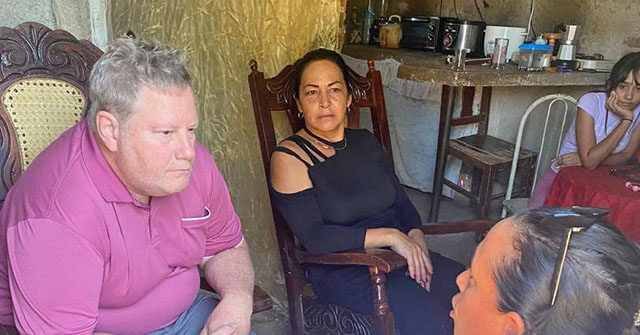Cuban Deputy Foreign Minister Carlos Fernández de Cossío on Wednesday said that the communist regime has not ruled out expelling the head of the U.S. embassy in Havana, Mike Hammer, who they recently accused of being a “subversive agent.”
Fernández de Cossío spoke with EFE on the subject of U.S.-Cuba relations following the return of President Donald Trump to the White House, particularly the actions President Trump and Secretary of State Marco Rubio have taken against the ruling communists. The Trump administration has, among other actions, reintroduced Cuba to the U.S. list of States Sponsor of Terrorism (SST), cracked down on the Castro regime’s slave doctor program, and imposed specific travel restrictions on Cuban nationals. The Cuban official stressed to EFE that “any alternative” to the current scenario would apparently be “better.”
“With regards to the diplomat [Hammer], we are not going to rule out any action insofar as we think that what he is doing is dangerous, if we come to that conclusion — which we have not — and insofar as we pay close attention to what he is doing,” Fernández de Cossío said.
Hammer, who in the past has served as U.S. ambassador to other countries such as Chile and the Democratic Republic of the Congo, is presently leading the U.S. embassy in Havana as its chargé d’affaires since November 2024. The U.S. has not appointed a new ambassador to Cuba in over six decades after the Castro regime forcefully took control of the island.
In recent weeks the Castro regime accused Hammer of being a “subversive agent” of the United States and engaging in purported “meddling and unfriendly conduct” after the diplomat, who speaks Spanish fluently, began traveling around Cuba to meet with local communities, dissidents, and families of the regime’s political prisoners.
Last week, Hammer published a video of his most recent trip around Cuba, visiting the municipalities of Artemisa and San Antonio de los Baños, where he held “friendly and valuable” exchanges with its local residents and young Cubans, who the U.S. diplomat described as the future of the island-nation.
Hammer explained in May that his goal is to allow Cubans to share their stories, concerns, and dreams with him, and emphasized that he has received a warm reception from the locals — some of whom blamed the Castro regime and not the U.S. “embargo” on Cuba as the cause of the nation’s woes. The Cuban Foreign Ministry, without presenting evidence to substantiate its claims, claimed in a protest note in May that Hammer is “inciting” Cubans to “commit serious criminal acts” and act against regime authorities.
Asked by EFE what Havana could do about Hammer attempting to engage positively with the Cuban people, Fernández de Cossío answered that “one wonders” which government officials, politicians, and other individuals Hammer knows or interacts with, and if he has “influence” over said people.
The Cuban official further asserted to the news agency that the U.S. government “has no interest in discussing any serious or official issue with us, none,” and stressed that the first thing a diplomat in any country must do is “to earn the respect of the authorities where he is. And he has evidently been given the task of not earning that respect.”
“He evidently does not enjoy respect in any of those places and that is why he struts around the country. He goes around with an audiovisual production team, he moves around in a set of vehicles,” de Cossío whined, “apparently trying to give the impression that he is a great personage, as if a president were coming, assuming that the Cuban population — which is educated and educated — is going to be impressed.”
“But that, of course, is not his decision. He has been instructed to do this. I would not speak of a Rubio/Hammer binomial, I would say that there is Marco Rubio with a very aggressive policy, and this is the instrument that, the poor man, has been given the task of being a kind of scarecrow in Cuba that drives people away, because the Cuban people, with the education they have, know what he means, know what he represents,” he continued.
The Deputy foreign minister claimed that the Castro regime is “not surprised” about the “coercive measures” implemented by the Trump administration, and asserted that the ruling communists had foresaw the possibility that Trump would win in 2024 and the influence of “anti-Cuban” sectors in the U.S. would have on his administration, and the possibility of new sanctions against the communist regime.
“History has shown that every time they have a period like the current one, when they believe that their goal of overthrowing the Cuban government and destroying the Cuban revolution is near, they rush into action pretending that this is the step they need to take,” Fernández de Cossío said.
“We of course are taking and will take measures to protect ourselves from the actions of the United States. To respond in the sense that we have to respond, without ever taking hostile measures against the people of the United States and taking measures that threaten the national security of the United States, the welfare of the people of the United States,” he continued. “That is not the kind of practice that Cuba does, our history does not show that.”
Fernández de Cossío stressed that the Castro regime will try to avoid the impact of the measures and “resist, but resist, as our president says, as creatively as possible.”
Christian K. Caruzo is a Venezuelan writer and documents life under socialism. You can follow him on Twitter here
Read the full article here


